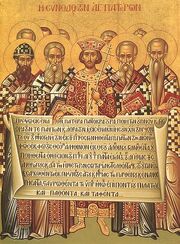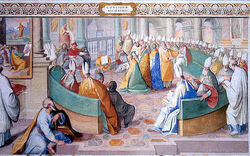| Council of Auroria | ||||||||||
|---|---|---|---|---|---|---|---|---|---|---|
| ||||||||||
The Council of Auroria was a council of Hosian bishops convened in Auroria in Selucia by the Aurorian Bishop ... in 533 CE. This ecumenical council was the first effort to attain consensus in the church through an assembly representing all of Hosianism.
Its main accomplishments were the creation of the first international Hosian church, the Holy Apostolic Hosian Church of Terra, formalizing Hosian doctrine, the construction of the Creed of Auroria, establishing the Hosian Biblical cannon, and promulgation of early canon law.
First Hosian international church
Aurorian Creed

The Fathers of the Council of Auroria holding a depiction of the Aurorian Creed
«Credo in unum Deum, omnipotentem Patrem omnium,
Caeli et Terrae factor, et omnium visibilium et invisibilium. (Qui adiuvat Ariel ad Sanctum Iseleum, et populum eius protegit.)
Et in unum Dominum, Eliam Pium, Purum et Sanctum Spiritum Dei, Qui factus est ante omnia saecula cum Terris, Et annunciatus per prophetas, Sanctum Verbum Dei, Ex Sarahaea Virgine in hominem incarnatus, Qui est lumen terrae nobis, Verus servus veri Dei.
Qui Pios vocavit ad verbum Suum sequendum, Et fugatus est a hominibus impiis in desolationem, Qui, persecutus in exilium, Fortificavit animum, et officium fecit, Etiam in mortis periculo, Quadraginta oravit in desperationem. Et ascendit ad caela, Et descindit in infernum tertium die ad peccata nostra tollenda. Triumphans rediit, et vanescit in Occultationem.
Qui, per gratiam divam, Misit nobis lucem Dei, Quae illuminavit Verbum Suum per prophetas, Ut nobis maneat et illuminet viam, Et donet nobis animum in fidem, In memoriam precedentes.
Credo Eliam in aeternam vivere, Et iterum venturus est post tempore, Iudicare vivos et martuos, Salvatorem Terrae esse, Cuius regnum continuabit in saeculo saeculorum.
Donec accepto veritatem doctrinarum Suorum, Audio et vivo Annunciationem Suam, In communitate Piorum, Unam, sanctam, oecumenicam et apostolicam Ecclesiam. Confiteor unum baptisma per remissionem peccatorum, In expectatione novae vitae, In saeculo saecolorum. Amen.» |
«We believe in one God, Almighty Father to Us All,
Who created Terra and Caelum, all that is visible and invisible, (Who led Ariel to Holy Yishelem, and shielded his people.)
And we believe in one Lord, Eliyahu Hosios, Pure and Holy Spirit of God, Created with Terra before all ages, Announced through prophesy, Holy Word of God, through the virgin Sarahea in man incarnate, Who is light to our world, True servant of the one true God,
Who called us, the Pious, to follow His word, And was exiled to the desert by vengeful man, Who, persecuted even in exile, Strengthened His resolve, and did His duty, Even in the face of death. For forty days did He pray in His despair, And then ascended into heaven. And on the third day He did descend to hell to bear our sins. Returned triumphant, then disappeared into Hiding, According to scripture.
Who, with divine Grace, Sent to us the Light of God, Which illuminated His Word to the prophets of old, To remain with us to light the way, And give us strength to believe, In memory of those who came before,
We believe that he has life eternal, And that at the end of times, He shall return to judge living and dead, To be Saviour of Terra, And that His Kingdom shall continue, In time and eternity.
Until such a time, we hold true to His teachings, Hear and live His Annunciation, In the Community of the Pious, One holy, apostolic and ecumenical Church, We acknowledge one baptism for the remission of sins, In the hope that we shall live again, In life eternal. Amen.» |
Biblical Canon
The Council of Auroria had the task of deciding which of the numerous books used by the various churches were to be considered authentic, and which to be discarded as heretical. The council decided upon the following books, which are still accepted as canon by most churches today:
- The First Word (Katub, Yeudi Books)
- Three Books of Elior/Triteuch (Pentateuch):
- Book of Creation (Genesis)
- Book of Exile (Exodus)
- Book of Law (Leviticus, Numbers, Deuteronomy)
- Histories
- Book of Tribes (Judges, Samuel)
- Book of Kings (Kings, Chronicles)
- Prophets (those with an asterisk are considered Great Prophets)
- Joshua* (Isaia)
- Jonathan*
- Abimelech, Obadiah, random Hebrew names, etc.
- Poetic Books
- Book of Hymns (Psalms)
- (Deuterocanonic books, not universally acknowledged as part of the Canon)
- Three Books of Elior/Triteuch (Pentateuch):
- The New Word (the Annunciation)
- The Annunciants
- The Annunciation according to Julius (Marcus)
- The Annunciation according to Theodore (Matthew)
- The Annunciation according to (Luke)
- The Annunciation according to Joseph (John)
- Acts of the Apostles/Disciples (?)
- Epistles
- Epistle of Michael
- Epistle of Thomas
- Revelation
- Revelation to Joseph (John)
- The Annunciants
Discarded beliefs
Demiurge God
- two Gods
- developed over time; originally believed that Eliyahu was "adopted" into position by God after proving his holiness; rather than being the Spirit of God or
- originally believed that there were two Gods; one "God of the Earth" who hated mankind and ruled the physical world, & the "God of the Heavens" who ruled the divine or spiritual world, loved mankind and wished to save them from suffering
- "God of the Earth" was later defeated by "God of the Heavens"'s chosen son Eliyahu during his temptations in the wilderness and became Satan therefore paving the way for "God of the Heavens" triumph
Docetism
- Docetism
- Eliyahu's physical body was an illusion, as were his miracles; that is, Eliyahu only seemed to have a physical body and to exist, but in reality he was incorporeal, a pure spirit, and hence could not physically exist.
"Hidden Messiah" & Reincarnation
- related to "Chosen few"
- belief that Eliyahu's disappearance was his rebirth in a new Hidden Messiah
- Job of church was search for Hidden Messiah; which led to "chosen few" who were reincarnated church leaders or important theological figures
- belief that this Earth was the only Hell and there was nothing to fear from death except possible rebirth
God is Non-Redeeming & Predestination
- The view that Hosians who fell from grace could not be redeemed, also in contrast to the Hosian view that contrition could lead to a sinner's restoration to the church.
- A stronger emphasis on the avoidance of sin and church discipline than in orthodox Hosianism. They emphasized chastity, including forbidding remarriage.
- God has predetermined who is to reach heaven; and it is conditional on behavior
- no amount of good deeds, piety, no prayer can bring a non-elected to heaven

